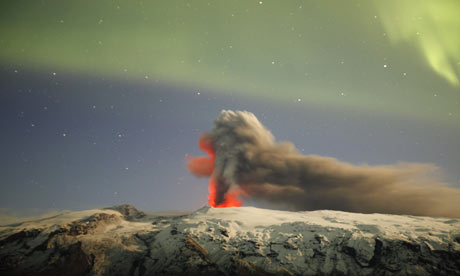Volcanic ash: air industry was warned in 2007
International watchdog told industry flight bans were possible and called for guidelines three years ago

The Northern Lights are seen above the ash plume of Iceland's Eyjafjallajokull volcano, on Thursday 22 April 2010. Photograph: LUCAS JACKSON/REUTERS
The body co-ordinating the international response to the spread of volcanic ash has been aware for at least three years of the need for new guidelines setting out the conditions under which aircraft can keep flying after an eruption.
Airlines and tour operators have expressed scepticism that the ash levels in the atmosphere merited the unprecedented closedown of European airspace. The six-day ban cost the airlines around £1.1bn, according to the International Air Transport Association (IATA).
It has now emerged that the International Airways Volcano Watch Operations Group, a division of the International Civil Aviation Organisation, discussed three years ago establishing what might constitute "safe" levels of ash for aircraft to fly in. But the aircraft manufacturers were reluctant to talk about the issue. The revelation came as it emerged that Britons still stranded abroad could be stuck for another week.
Mark Tanzer, chief executive of Abta, the travel association, said: "While most flights are back to normal, and most stranded British passengers will be back this weekend, there is still quite a high level of disruption in some destinations. In some areas of the world there is a significant lack of air capacity to enable British people to be returned quickly."
Minutes of the Volcano Watch group's annual meeting, held in New Zealand in 2007, note: "There is no definition of a safe concentration of ash for different aircraft ... In order to give a reliable and justifiable all-clear, once a plume has dispersed enough to be undetectable, clear limits of ash content are required from both the manufacturers and aviation licensing authorities." It acknowledged that establishing a safe lower limit was a "difficult and longstanding problem".
A working paper, published by the group after the meeting, warned that airspace shutdowns were likely. It stated: "As remote sensing techniques improve, it is likely that the aggregate areas where ash is sensed or inferred will increase, possibly leading to over-warning for ash and cost-blowouts for airlines."
The following year's meeting examined problems with the monitoring of Iceland's volcanoes. It considered a proposal from the Iceland Meteorological Organisation for a second "Doppler weather radar in the eastern part of the country to assist in monitoring the volcanic eruption activity in that area".
The minutes noted "such eruptions could have a major impact on aircraft operations over the NAT [north Atlantic] regions since Icelandic volcanoes were situated close to important air routes". However, the meeting concluded that the proposal required a scientific evaluation which it could not authorise.
The group's fifth meeting, held this year in Chile two weeks before the Icelandic eruption, invited the aircraft manufacturers to discuss what might constitute safe ash levels. However, the minutes reveal: "IATA informed the group about the strong efforts made in order to get representation from the industry at the workshop but unfortunately these efforts had not been successful."
Yesterday Sir Richard Branson criticised the blanket ban and called for the government to compensate the industry. "All the experts were telling us there was no danger," Branson said. "There were plenty of corridors through which the airlines could have flown which would have been quite safe."
Branson added: "A blanket ban of the whole of Europe was not the right decision. The first few days the ash was up at 35,000ft, the planes could have flown below 35,000ft. There were plenty of ways of dealing with it. But actually planes have to put up with sandstorms in Africa; the engines are designed to put up with a lot more than existed."

No comments:
Post a Comment